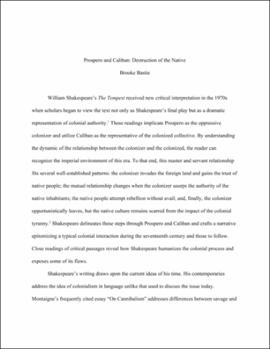| dc.contributor.author | Bastie, Brooke | |
| dc.date.accessioned | 2019-02-06T19:54:35Z | |
| dc.date.available | 2019-02-06T19:54:35Z | |
| dc.date.issued | 2018-05-03 | |
| dc.identifier | oksd_bastie2_HT_2018 | |
| dc.identifier.uri | https://hdl.handle.net/11244/317121 | |
| dc.description.abstract | This paper explores colonialism and post-colonial theory in Shakespeare's The Tempest. The actions of the play signify four steps in the development of the colonial relationship: formation, usurpation, rebellion, and departure. Through analysis of Montaigne and close readings of several critical passages in the text, not only does the colonial pattern repeat itself in Shakespeare's play, but the relationship between the colonizer and colonizer comes to light. Prospero and Caliban's dialogue signifies the colonial dynamic. The destruction of the native and his culture takes place by looking at the actions and reactions of Caliban. Although Caliban inevitably remains subservient to Prospero's rule, other societies in the 1960s see admirable attributes and connecting factors between their story and that of Caliban's. The Tempest then acts as an example of colonial thought and the colonial dynamic during Shakespearean times. | |
| dc.format | application/pdf | |
| dc.language | en_US | |
| dc.rights | Copyright is held by the author who has granted the Oklahoma State University Library the non-exclusive right to share this material in its institutional repository. Contact Digital Library Services at lib-dls@okstate.edu or 405-744-9161 for the permission policy on the use, reproduction or distribution of this material. | |
| dc.title | Prospero and Caliban: Destruction of the native | |
| osu.filename | oksd_bastie2_HT_2018.pdf | |
| osu.accesstype | Open Access | |
| dc.type.genre | Honors Thesis | |
| dc.type.material | Text | |
| dc.contributor.director | Walker, Jeffrey | |
| dc.contributor.facultyreader | Jones, Edward | |
| thesis.degree.discipline | English | |
| thesis.degree.grantor | Oklahoma State University | |
